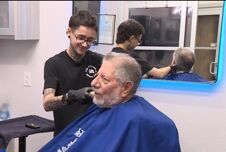A Utah school district has decided to remove the Bible from elementary and junior high school libraries after a parent challenged the religious text under a state law banning “pornographic or indecent” material in schools.
A committee appointed by Davis School District to review challenged books determined that the Bible “does not contain sensitive material” under Utah’s criminal code defining pornographic and harmful materials. The book will remain on high school library shelves. But Davis School District’s director of communication Christopher Williams confirmed that it would be removed from elementary and junior high schools.
Related:
Oklahoma’s head superintendent wants to ban LGBTQ+ books but teach the Bible in history classes
The Bible contains a story about two daughters who get their dad drunk to have sex with him, but it’s LGBTQ+ books that are the problem.
“The committee also decided to retain the book in school library circulation only at the high school level based on age appropriateness due to vulgarity or violence,” Williams told KSL.com.
Stay connected to your community
Connect with the issues and events that impact your community at home and beyond by subscribing to our newsletter.
The committee’s decision has already been appealed by an individual who wants the Bible to be retained in school libraries at all levels, Williams said. An appeals committee consisting of three members of the district’s Board of Education will review the original complaint, filed last December, and make a recommendation to the full board to vote on, according to the Salt Lake Tribune.
Last year, Utah lawmakers passed H.B. 374, which requires public K–12 schools to remove books containing “pornographic or indecent material.” Critics say the law has been used to remove books by mostly LGBTQ+ and Black authors from shelves.
In their December 2022 Bible challenge, a parent whose name and address were redacted suggested that H.B. 374 makes the “bad faith process” of removing books from school libraries “much easier and way more efficient.” They described the Bible as “one of the most sex-ridden books around” and included an eight-page list of passages they said should be considered unacceptable under the law.
“Incest, onanism, bestiality, prostitution, genital mutilation, fellatio, dildos, rape, and even infanticide,” the parent, who noted that they have actually read the Bible, wrote. “You’ll no doubt find that the Bible, under Utah Code Ann. § 76-10-1227, has ‘no serious values for minors’ because it’s pornographic by our new definition.”
“Get this PORN out of our schools,” they continued. “If the books that have been banned so far are any indication for way lesser offenses, this should be a slam dunk.”
In March, after the challenge drew national media attention, Williams said that Davis School District was taking it as seriously as any other book challenge. “We don’t differentiate between one request and another,” he said. “We see that as the work that we do.”
But Utah state Rep. Ken Ivory (R), who sponsored H.B. 374, described the request as a political stunt that would “drain school resources.”
Ivory told KSL.com that the Bible challenge was “a backhanded slap to parents that are simply trying to keep a healthy learning environment for all students in the schools.”
In an October 2022 report, the Utah State Board of Education said it had tracked 280 book complaints in just nine schools over a six-month period. Last August, PEN America released a list of 52 books that had been challenged in one Utah school district under H.B. 374. The list included many LGBTQ+-related titles, including Maia Kobabe’s graphic novel Gender Queer, George M. Johnson’s All Boys Aren’t Blue, and Jonathan Evison’s Lawn Boy. According to the Salt Lake Tribune, most of the books that have been challenged deal with race or LGBTQ+ issues.















